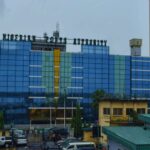By Mohammed Bello-Koko
The focus of the Nigerian Ports Authority in line with the Federal Government’s port reform agenda, has been the enthronement of a competitive port system that supports efficient handling of ships and cargo, facilitates the smooth evacuation of imports from overseas and receipt of exports from the hinterland, served by road, rail and inland waterways.
Effective cargo handling requires that there must but adequate cargo handling plants and sufficient trucks for cargo evacuation from the ports. After the 2006 port concession programme, the Lagos Ports witnessed upsurge in cargo throughput and with the deplorable state of the port access roads; this led to vehicular congestion on the port access corridors.
Traffic Management along the access roads to the ports in Lagos grew into a major challenge for the Nigerian Ports Authority. Consequently, an Integrated Truck Traffic Management System (e-call up system) which requires the combination of information technology and physical infrastructure was evolved in partnership with an indigenous company – Messrs Truck Transit Park Limited (TTPL), to bring an end to the situation.
The e-call up system is based on the principle that all port-bound trucks shall be called from a truck park or empty container holding bay, before they can have access to the ports. The system manages the scheduling of trucks to access the ports from satellite truck parks or a pre-gate as the case may be, with minimal human interference.
It is noteworthy to stress that, the effectiveness of the e-call up system is dependent on three major factors namely: Physical infrastructure, Information technology and Stakeholders collaboration.
Physical Infrastructure
Inadequate physical infrastructure (such as truck parks and holding bays) has been a major constraint to the smooth transfer and delivery of shipments in and out of the ports. To nip this challenge in the bud, the Nigerian Ports Authority mandated all shipping companies to comply with the Authority’s empty container policy. The empty container policy requires all shipping companies involved in container operations to have empty containers holding bays in locations other than the port precincts or the maritime logistics ring. The logistics ring is from Tin-Can Island Port to Mile 2 and also from Lagos Port Complex to Eric Moore Bridge down to Orile -Mile 2.
With the introduction of the e-call up system, movement of the empty containers from these holding bays are done electronically in scheduled batches.
The Authority in December 2020 via a public advert invited private truck parks operators for their facility to be used as satellite truck parks after fulfillment of the set conditions in the advert. This is aimed at standardizing truck park operations and providing dedicated space where all the trucks hitherto on the roads and bridges would temporary stay before being scheduled to the ports.
Also, the Authority converted the Lilypond Container Terminal, Ijora to serve as Truck Transit Park. The newly-built Truck Terminal at Tin-Can Island Port (known as MOB Park) was integrated into the network of parks for the e-call up system. The Ahmed Bola Tinubu Park at Orile Iganmu, provided by the Lagos State Government has been identified as a potential feeder park to hold static traffic and also feed the Lilypond Truck Transit Park for the port bound trucks. Currently, thirty-one (31) truck parks have been approved across Lagos State to accelerate implementation of e-call up system.
Information Technology
All approved truck parks are to be well equipped with telecommunication gadgets that would allow for proper integration and monitoring of activities in these parks on a 24/7 basis.
Some of the equipment expected at the parks include: Closed Circuit Television (CCTV), Electronic Access Barrier (Access Gate), Inverters for constant power supply, reliable internet connection (preferably Local Area Network, LAN) and Bollards.
A team of officials from the NPA constantly visits these parks to ensure that these gadgets are functioning. The provision and installation of these hi-tech gadgets has accelerated the implementation of e-call up system.
The Lilypond Transit Truck Park serves as the Pre-gate and Central Control Room for all truck park activities.
Stakeholders Collaboration
We are quite aware that the e-call up system for trucks will not achieve the desired outcome if stakeholders do not buy into it. In order to accelerate its implementation and create awareness, the NPA sensitized both its internal and external stakeholders through town hall and virtual meetings. Also broadcast media (radio jingles) was used to sensitize stakeholders. The essence of the sensitization exercise is to feel the pulse of the maritime stakeholders towards the e-call up system and gain feedbacks from them in order to ensure a smooth takeoff. It is pertinent to state that after the acceptance of the e-call up system, some of the transport unions sponsored radio jingles themselves towards ensuring that their members are well informed about the e-call up project.
Amongst the industry stakeholders engaged by the Authority include freight forwarders, shipping companies, the various transport unions operating at the port, owners of empty container holding bays, barge operators, terminal operators etc.
Government agencies such as Nigeria Customs Service, Federal Road Safety Corps and relevant Agencies under the Lagos State Government serving as the enforcement backbone of the project
Other Contributory Factors are:
Barge Operations
The Authority embraced the intermodal transport approach in tackling the vehicular congestion on the port access roads. This was by encouraging the use of barges. Trucks are captured on the “eto” platform and are moved via barges to the port thereby reducing the travel time had the truck moved by road to the port.
Export Processing Terminals
To address the bottleneck faced by exporters to process their documents, the Nigerian Ports Authority engaged the Nigerian Export Promotion Council (NEPC) on the establishment of Export Processing Terminals. The goal is to ensure that export containers are given priority. All export documentation would take place in the terminals, thereafter the trucks conveying the export containers will now be scheduled to access the port electronically.
Encumbrances to the Implementation of Truck E-Call Up System
The e-call up system like any other novel initiatives come with its teething problems. However, these teething problems are surmountable and the Authority is working towards resolving them ASAP.
Enforcement of traffic rules and regulations has been a challenge since the roll-out of the e-call system in February this year.
A key deliverable that we’re working to establish is a dedicated unencumbered lane for other road users along the port corridor, Ijora to Apapa 24/7. This is the source of discontent by the Apapa residents of unregulated truck movement within the Apapa environment.
Poor supervision at night – the supervision of trucking activities at night has totally collapsed due to the antics of unscrupulous law enforcement operatives.
Activities of security agencies (Nigeria Police/LASTMA/NPA Security/FRSC) are having adverse effect on the ecosystem, instead of supporting the project particularly at night. The Lagos State Police Command has identified over thirty checkpoints specifically interfering with traffic movement and sabotaging the e-call up project.
Activities of miscreants tagged ECOMOG Boys and members of the disbanded Presidential Task Team
Need to open-up the Tin-Can road corridor currently shutdown by the construction company -HITECH
Rehabilitation of the Lilypond/Danlami road corridor by the Lagos State Government. Palliatives urgently required to provide temporary relief.
As the main promoter of the e-call system for trucks, the NPA has intensified its engagement with the system operator – Messrs TTP Ltd., to enhance service efficiency and response time to users of the “eto” platform.
Deployment of infrastructure – Bollards, spikes and automated barriers, CCTV – to be fully installed at Port gates and other entry/exit points especially Tin-Can where such infrastructure are practically nonexistent. Similarly, these infrastructures should be fully available in the approved parks and holding bay locations.
Human Resources – The quality and experience should be scaled up.
Customer Service – Customer service needs to be rejigged.
Collaboration with truck park operators – TTP to improve its collaboration with trucking companies and truck park operators and make relevant information available ASAP.
However, as the landlord, the Nigerian Ports Authority is working to address the following:
I. The involvement of our staff in sharp practices
II. We are continuously engaging with the Federal Ministry of Works to open up the Tin-Can corridor. The NPA is seeking His Excellency, the Executive Governor of Lagos State support as complete closure is a chokehold to port operations at Tin-Can Island Port.
III. Opening up the Creek Road corridor to allow free movement of trucks and jetty locations along the corridor.
IV. The Authority is also working to ensure that the flour millers and other factories located in the port are fully complaint to the e-call up system and they should adhere to the time belt allotted to their truck category.
V. Petroleum Product Tankers – this category of trucks has not been integrated into the e-call up system. Management has held meetings with the truck (tankers) unions on the need for their vehicles to be scheduled before accessing the port area. We are working with LASG in this regard.
Mohammed Bello-Koko, is Acting Managing Director of the Nigerian Ports Authority

 Join Daily Trust WhatsApp Community For Quick Access To News and Happenings Around You.
Join Daily Trust WhatsApp Community For Quick Access To News and Happenings Around You.


